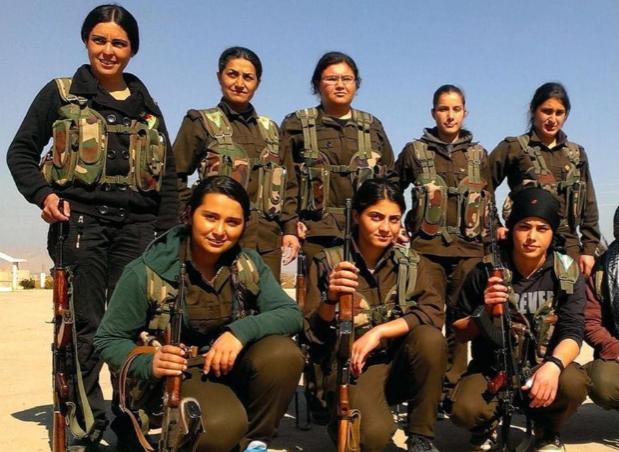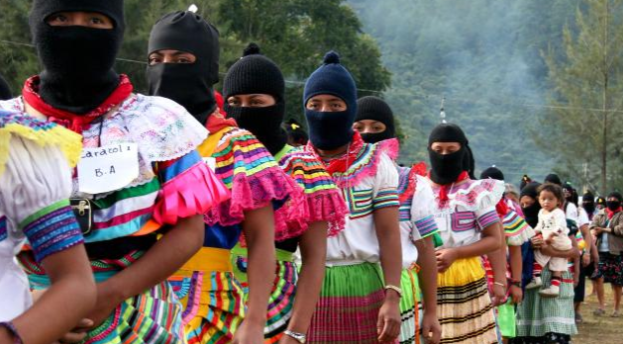
Kurdish Fighters Outside of Kobani 
Zapatista Women at the II Encuentro de Mujeres que Luchan
By Raúl Romero
Kurdistan is a people with their own language and culture that live between the Tigris and Euphrates rivers. For years and in different ways, these people struggle for their self-determination. In the past, the Kurdish territories were divided by the Ottoman and Persian Empires. After the imperial allotment that came with the first world war, the Kurdish people were divided between Iraq, Iran, Syria and Turkey.
The struggle of the Kurdish people for their liberation has also become a struggle for their survival in which they face armies of national governments, of the Isamic State, and of imperial powers. Amongst them, the Kurdish organizations are many and diverse, and these differences are often used by actors interested in the oil of the region to diminish the resistance.
Among the organizations of the Kurdish people, the Workers Party of Kurdistan (PKK), a Marxist-Leninist organization founded in 1978 which formed part of the anti colonial struggles that exploded in those years. With the passage of time, the PKK started transforming itself intellectually to find its own path, Democratic Confederalism, a project that according to Abdullah Öcalan — ideological figure and political prisoner— caracterized as being flexible, multicultural, anti-monopolist, oriented toward consensus and where ecology and feminism are central pillars.
Democratic confederalism can be stated as an anticapitalist, antipatriarchal, and popular project built by the Kurdish people which experienced a paradigmatic moment between 2012 and 2014: the de facto declaration of autonomy by Rojava, a region in Syrian Kurdistan, a process that found international resonance. In this process, the armed resistance led by Kurdish women and their congress Kongra Star would play a decisive role.
For the sociologist Azize Aslan, Rojava is not only the territory where the revolution is taking place, it is also a territory where the idea of a revolution is redefining itself. Her argument is powerful: there a network of assemblies is built that make direct democracy and self-government possible. The purpose of the system of popular assemblies in Rojava is to organize an anticapitalist and autonomous model for a State-less, anti-patriarchal and ecological society. (https://bit.ly/2MJ0NYG).
The theoretical depth and practice of critique and alternatives that are constructed in Rojava stand out for several elements: it is a questioning of capitalist modernity, of Nation-states, of hegemonic science, of the patriarchy and of ecocide. The critique is accompanied by a praxis aimed at construction — not without contradictions — of a democratic modernity with its confederalism, its autonomy, its alternative economy, its leadership by women, and also its critical science, a science that gave way to the Jineolojï, or science of women, based in ethics, aesthetics with practical power and related to the economy.
Alessia Dro, of the Movement of Women of Kurdistan, has indicated that one of the biggest contradictions of our time is that between the resistance of women and the patriarchy. That contradiction, reclaimed as the backbone of the Kurdish revolution is what makes thousands of women worldwide identify with this movement. To make the transformation we have to achieve change with a perspective of women’s liberation. Women’s liberation means liberation of society as a whole. This is something that the revolutionary movements in the world still have not even elaborated as an axis of priority, and I believe that for this reason there are women from many places who join the movement. (https://bit.ly/2PucW4H).
The theoretical and political solidity that the Kurdish revolution has achieved is reflected in the recognition of its peers in other parts of the world. It is with the EZLN and the Zapatista women with whom they have established a fraternal dialogue. In December of 2019, word from the women of Rojava arrived in Zapatista territory to the Footsteps of Comandanta Ramona seedbed, where the Second International Encounter of Women who Struggle was held:
Today we would have wanted to be together with the Zapatista women in the encounter of women that was held there, but it is clear that in our situation and with the attacks on our people, this has not been possible. But we can say that our hearts are there and with all of the women in struggle for their liberty and that of their people. Because we are fighting against every type of occupation imposed on the people, on all kinds of slavery imposed on women. And we are together in the struggle.
Movement of Women of Kurdistan
In Rojava and in Zapatista Chiapas, emancipatory alternatives of a new kind are being built. They are not the only ones, there are others with their own ways and times. A new history is being built and we must learn to listen to it.
* Sociologist
This article was originally published in La Jornada on March 6th, 2021. https://www.jornada.com.mx/2021/03/06/opinion/014a1pol This English interpretation has been republished by Schools for Chiapas. Photos: Kurdish Female Fighters is from The Kurdish Project and Zapatista Women is from a Chiapas Support Committee post.
